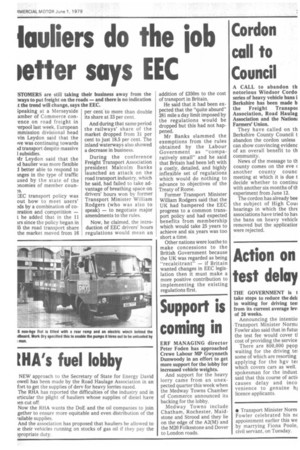lauliers do the job letter says EEC
Page 5

If you've noticed an error in this article please click here to report it so we can fix it.
STOMERS are still taking their business away from the [ways to put freight on the roads — and there is no indication .t the trend will change, says the EEC.
;peaking at a Merseyside amber of Commerce conence on road freight in rerpool last week, European mmission divisional head yin Leydon said that the me was continuing towards id transport despite massive I subsidies.
dr Leydon said that the id haulier was more flexible better able to respond to inges in the type of traffic used by the state of the mornies of member coun!s.
i:EC transport policy was out how to meet users' ?.ds by a combination of co..ration and competition — t he added that in the 11 irs since the policy began in ;5 the road transport share the market moved from 16 per cent to more than double its share at 33 per cent.
And during that same period the railways' share of the market dropped from 31 per cent to just 18.5 per cent. The inland waterways also showed a decrease in business.
During the conference Freight Transport Association president Malcolm Banks launched an attack on the road transport industry, which he said, had failed to take advantage of breathing space on drivers' hours won by former Transport Minister William Rodgers (who was also to speak) — to negotiate major amendments to the rules.
Now, he claimed, the introduction of EEC drivers' hours regulations would mean an addition of £.350m to the cost of transport in Britain.
He said that it had been expected that the "quite absurd" 281 mile a day limit imposed by the regulations would be dropped but this had not happened.
Mr Banks slammed the exemptions from the rules obtained by the Labour Government as "comparatively small" and he said that Britain had been left with a costly, detailed, and highly inflexible set of regulations which would do nothing to advance to objectives of the Treaty of Rome.
Former Transport Minister William Rodgers said that the UK had hampered the EEC progress to a common transport policy and had expected benefits from membership which would take 25 years to achieve and six years was too short a time.
Other nations were loathe to make concessions to the British Government because the UK was regarded as being "recalcitrant" — if Britain wanted changes in EEC legislation then it must make a more positive contribution to implementing the existing regulations first.












































































































